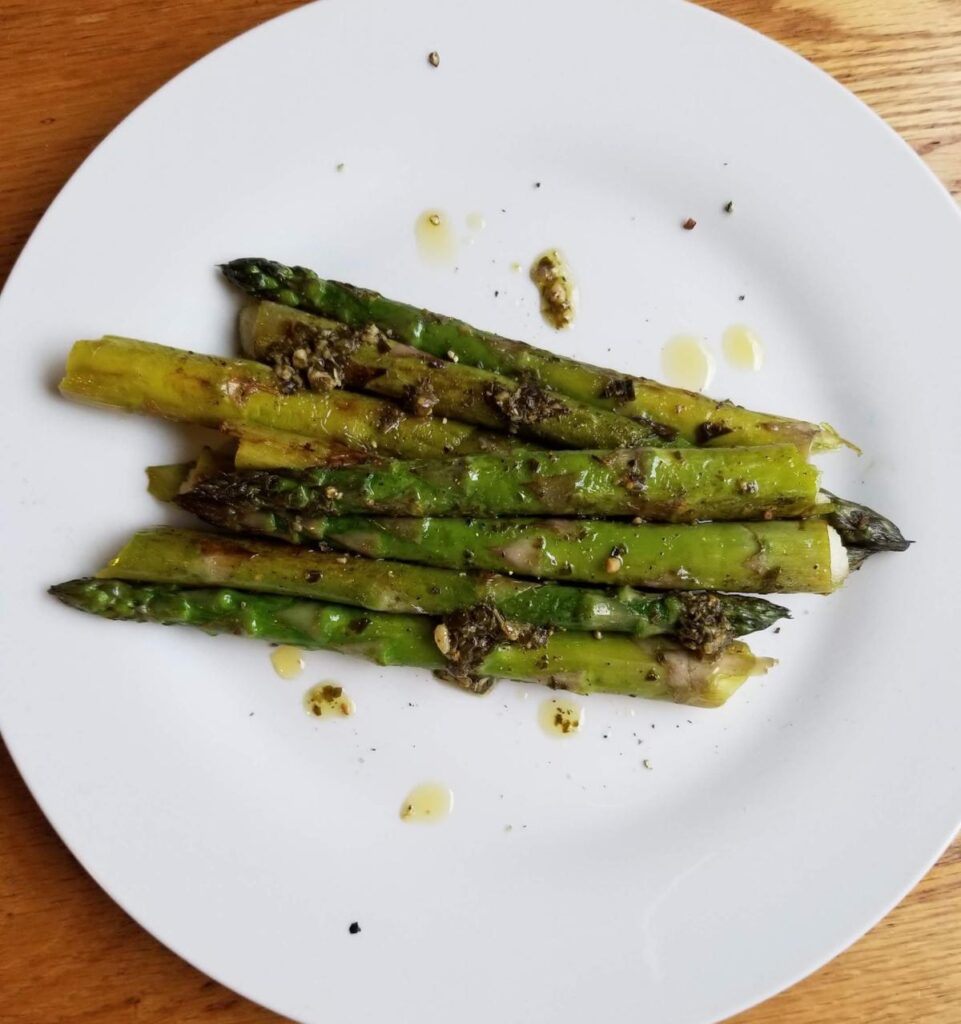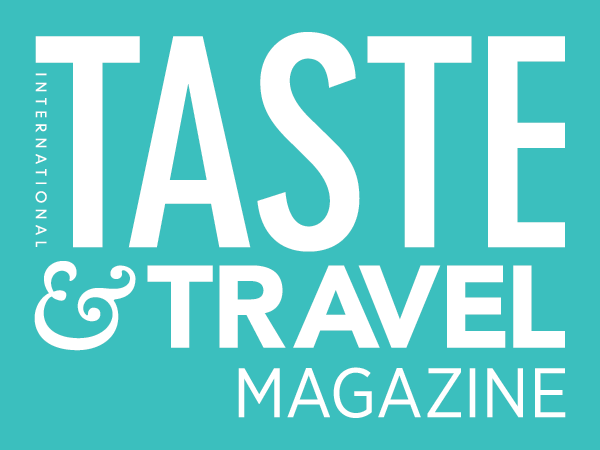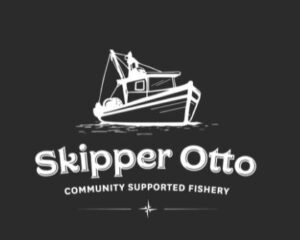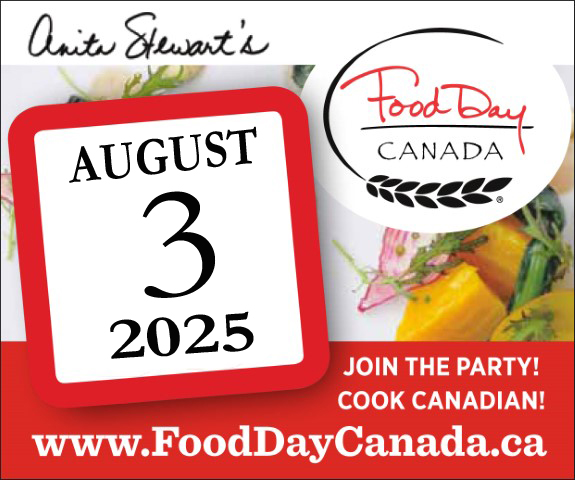The Coast Salish nations named it Quw’utsun’: “the warm land.” Late Canadian TV chef and food writer James Barber called it “Canada’s Provence.” It’s a place of fertile soil, a Mediterranean-like climate, and a profusion of farmers skilled at nurturing munificence from the land.
It’s Vancouver Island’s Cowichan Valley.
Just a 45-minute drive out of British Columbia’s capital of Victoria, the Cowichan Valley stretches some fifty kilometres along the TransCanada Highway from the coastal community of Mill Bay to the hillside town of Ladysmith. Located in the rain shadow of the Vancouver Island Ranges, the valley’s warm, dry summers and mild, wet winters provide its 700-plus working farms with the longest growing season in Canada. Here, the Slow Food movement has taken deep root, and the farmstands and restaurants that dot the countryside make life for dedicated locavores easy.
The valley’s oldest vineyards were planted in the 1980s. Since then, more than a dozen wineries have blossomed, some offering on-site restaurants (Cherry Point Estate and Unsworth Vineyards), cafes (Glenterra), gourmet picnics (Averill Creek), charcuterie platters (Blue Grouse, Emandare, and Zanatta), and even guesthouse accommodations (Emandare and Blue Grouse).
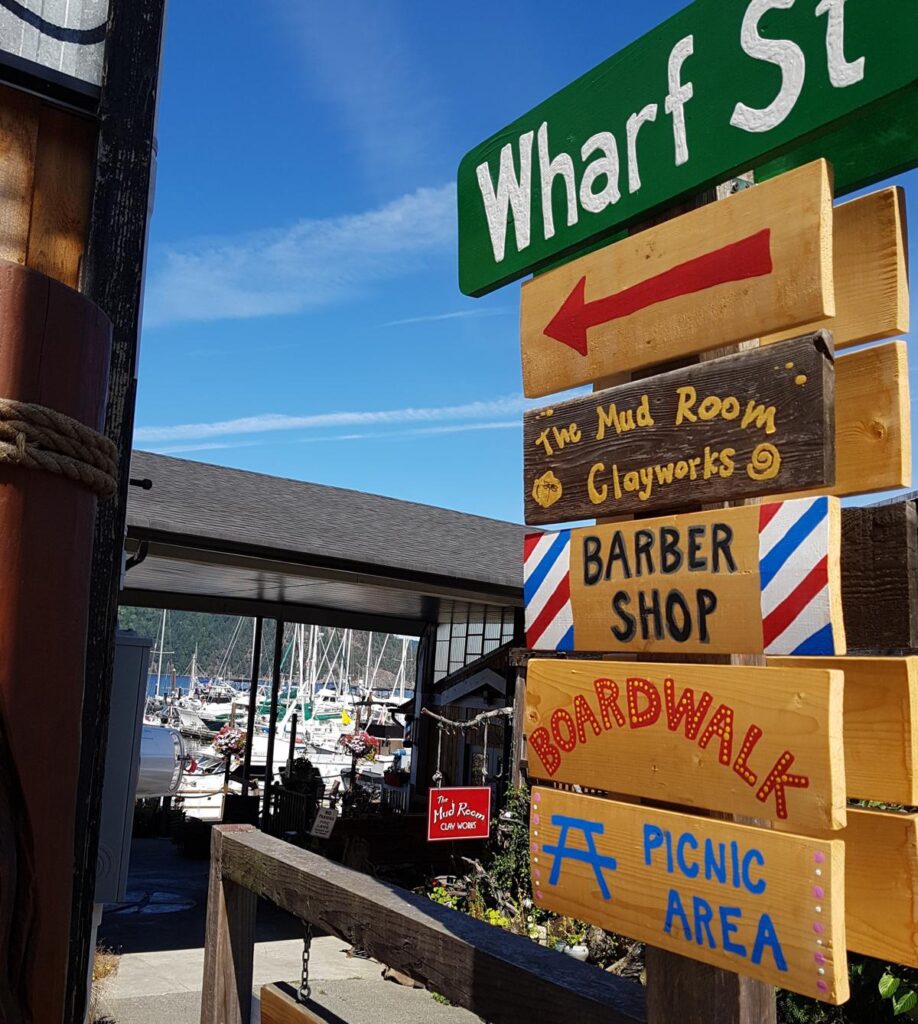
Outdoor enthusiasts flock to the region’s mountains and coastlines to hike, camp, kayak, fish or simply comb the rocky beaches. For cyclists, gutsy mountain bike trails abound, and the Cowichan Valley Trail offers 122 km of more forgiving terrain on converted rail trails. Artists and artisans have found their home here, too, and music festivals and live theatre punctuate the vibrant arts scene.
While my few days in Cowichan were just a toe-dip into its culinary compass (with farm visits, cooking classes and wine-tastings limited by Covid health restrictions), here were some of my favourite experiences.
Chemainus
The story of Chemainus — like so many Vancouver Island communities — is one of resilience: from its establishment as a logging town in 1858, through the rise and demise of its forestry and mining industries, to its reinvention as a tourist destination with a thriving arts community. The 40-plus murals that grace its facades document that history, as does the glittering arts centre offering full seasons of professional live theatre.
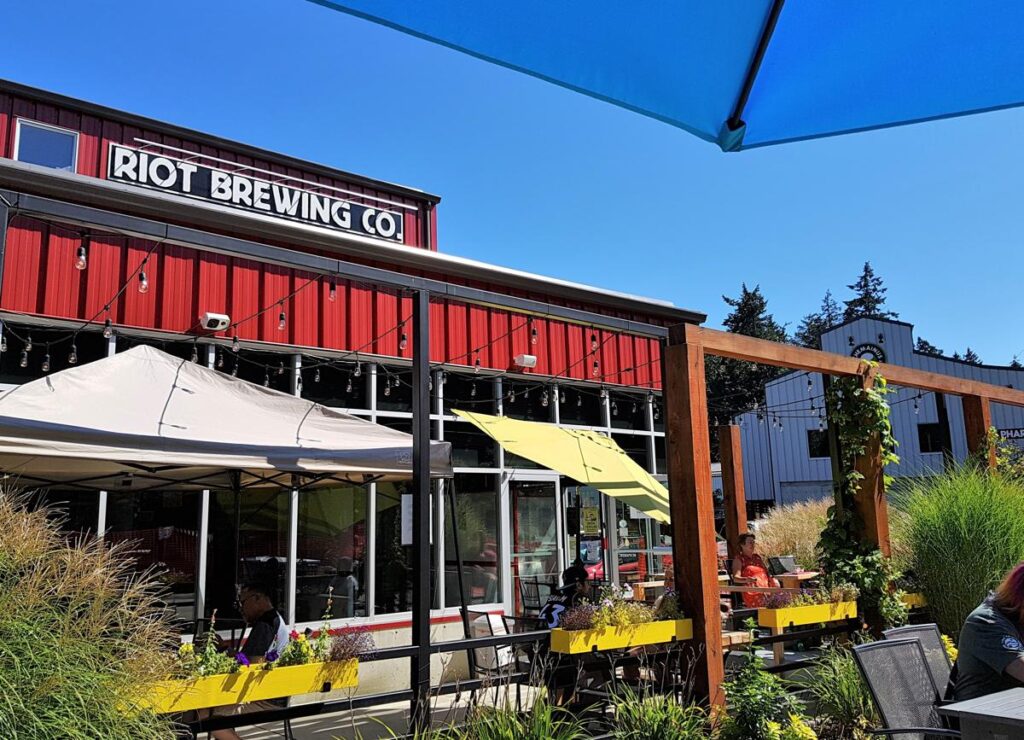
Just off the Cowichan Valley Trail that runs through town, a bright red roof announces the presence of Riot Brewing Co., drawing us and our bikes on a shortcut toward its expansive patio. Under the guidance of our brew-slinger, we order flights of the delightfully backstoried beers: the Life Partners Pale Ale introducing us to the couple who founded Riot in 2016, and the Lipslide Lager providing insight into one of the owners’ skateboard passion. But the passions of Alyson Tomlin (a BC craft beer pioneer) and Ralf Rosenke and their team don’t stop there. Their aim is to create a community hub, with a firepit and a family-friendly lounge complementing their tasting bar, as well as open mics, live music and comedy shows, and fundraisers like Beer & Cut Thursdays (with proceeds going to the Cowichan Women Against Violence Society). Their ever-evolving roster of beers reflects collaborations with local coffee roasters, bands, barbers and fellow brewers. The award-winning Working Class Hero scores big points on my palate with its dark and mild toasty malt flavours, as does the Peachful Protest Golden Peach Sour, a limited release created in 2020 to support diversity in brewing.
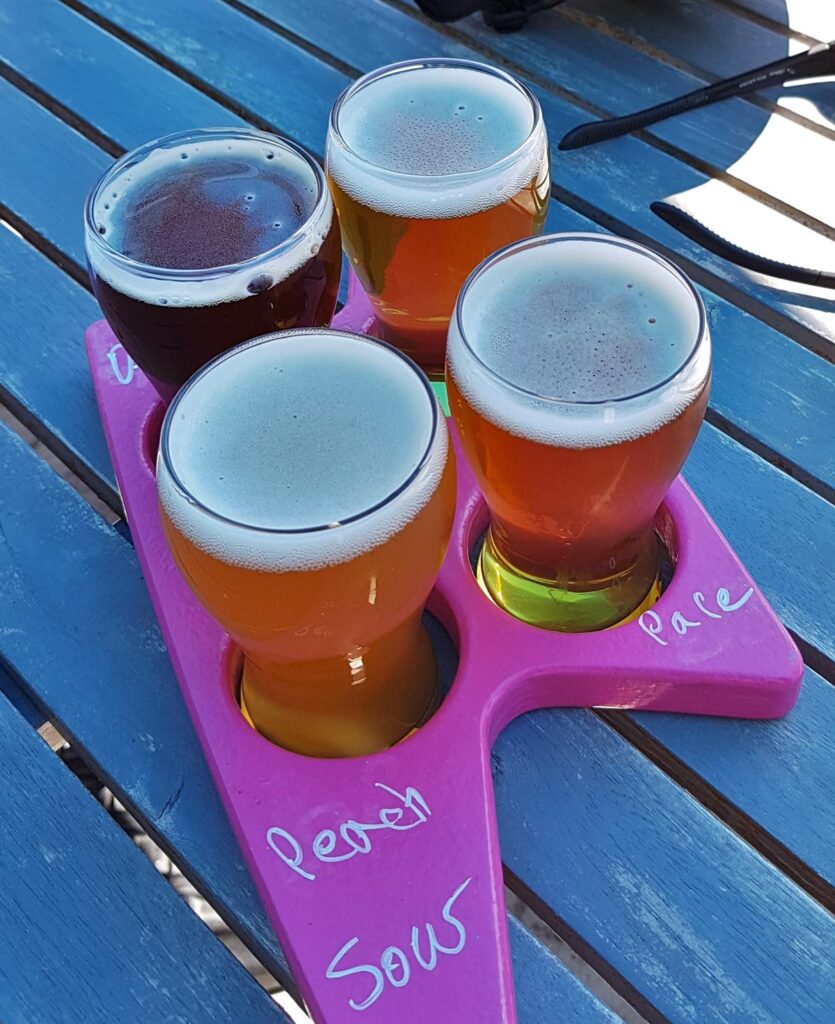
Riot offers a handful of snack choices like sausage rolls and samosas along with its brews, but encourages patrons to bring their own picnic, or order takeout from restaurants whose menus they keep onsite. We order lunch from Sawmill Taphouse & Grill, in part for its next-door location, but primarily for its farm-to-table tapas and smokehouse specialties. Sawmill takes pride in producing house-baked bread, scratch sauces, and house-smoked meats as well as pulling handcrafted Neapolitan-style pizza from its forno oven. Their Smoked Meatballs arrive at our table tossed generously with house marinara. But the Beef Brisket Poutine proves the real star: tender meat nestled with cheese curds on crispy pomme frites and drizzled with rich beef jus.
Duncan
With a population just under 5000, Duncan is the Cowichan Valley’s largest community and commercial heart. Its historic downtown hosts numerous galleries, shops and cafes, as well as Canada’s only year-round outdoor farmers’ market, where 150-plus vendors offer locally harvested produce and seafood, culinary products and artisanal crafts, clothing and furniture. In partnership with the Cowichan Tribes First Nations, Duncan has garnered the moniker “City of Totems” by developing one of the world’s largest outdoor collections of publicly displayed totem poles, which visitors can explore on guided or self-guided walking tours.
Just north of the city is Westholme Tea Company, an 11-acre former dairy farm that is Canada’s only commercial tea grower. Here, ceramic artist and former chef Margit Nellemann and tea connoisseur Victor Vesely have successfully nurtured hundreds of tea seedlings through ten Canadian winters, producing farm-grown teas that express the unique land, soil and climate of their location. Perhaps nowhere is this terroir captured so completely as in their Maple-Smoked Green tea, whose original rendition saw frost-bitten tea leaves and twigs cold-smoked with wood chips from a maple tree felled on the property. Westholme’s hand-harvested teas are sought after by international aficionados and some of the flowers and leaves find culinary applications among local chefs and artisans. Case in point: the award-winning Kazuki Gin produced by Sheringham Distillery.
In addition to producing their own teas, the husband-wife team imports pure teas, spices and herbs from small-scale organic farms worldwide. These they mix by hand into more than a hundred tea blends according to recipes informed by Nellemann’s well-developed palate. Three of these fascinating blends make it into my shopping bag, including the perfect-for-cold-brew Sweet Morocco that combines green gunpowder tea with West Coast peppermint, orange peel and unrefined stevia leaf. The shop also offers a selection of tea accessories, including Nellemann’s hand-built stoneware pieces incised with her original designs.
Cowichan Bay
An important fishing ground for thousands of years, Cowichan Bay now attracts travellers eager to experience its rich marine and bird life from the seat of a kayak or a whale-watching boat. Even more visitors come to explore the shops and cafes of the picturesque waterfront village.
A stroll along the shore takes us past the Cowichan Estuary Nature Centre — where volunteers bend over buckets, intent on eelgrass restoration — and onward to the Rock Cod Cafe. A village mainstay for almost 30 years, the Rock Cod vaulted into the public imagination with an appearance on the Food Network’s “You Gotta Eat Here” in 2012. Fish and chips are the raison d-être here, so I steer for the Captain’s Catch section of the menu featuring local fish (grilled, battered or prepped with one of the cafe’s signature crispy coatings or spice blends) that can be mixed and matched with ten different side dishes. My classic battered cod arrives perfectly crisped and wharf-fresh; the creamy clam chowder, redolent with herbs and dill.
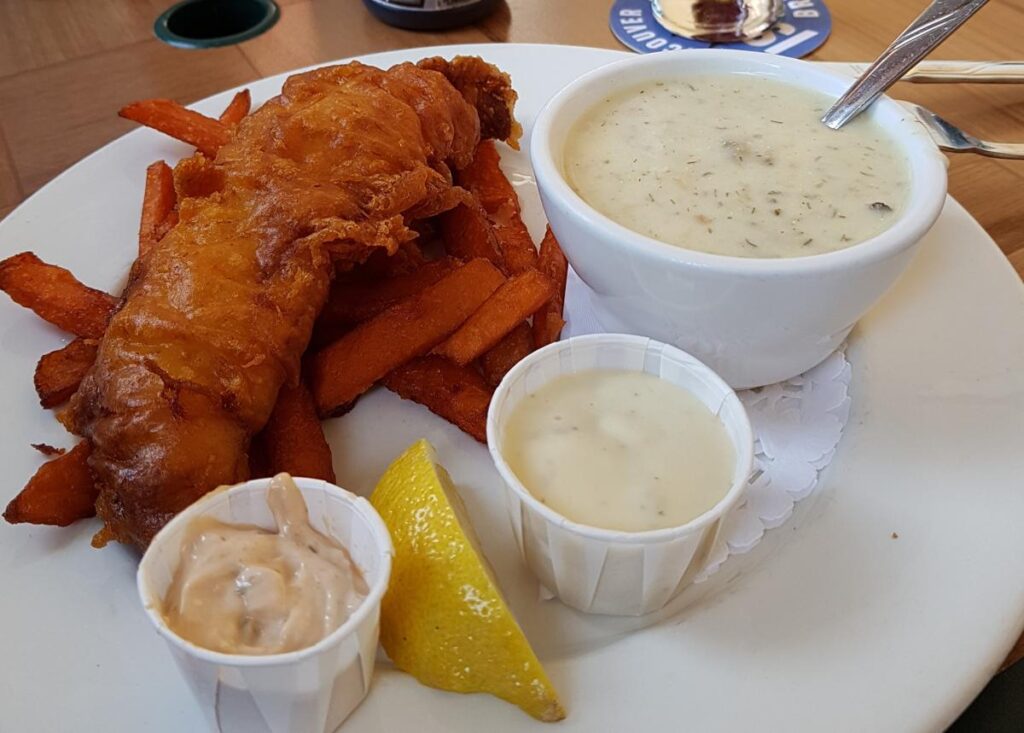
Rock Cod owner Jacob Hokanson is a former commercial fisherman and serves only sustainable seafood sourced through the Ocean Wise stewardship program. Local craft beverages from Red Arrow Brewing and Merridale Cider are on tap at the bar, and a celiac-friendly menu offers gluten-free versions of almost every dish.
Just down the street, a growing queue on the sidewalk attests to the quality of product and welcome to be found inside the bakery at True Grain Bread. Established in Cowichan Bay in 2004, and now with locations in Courtenay and Summerland, True Grain stone-mills 100-percent BC-grown organic grain to create handcrafted European-style breads and baked goods. Ancient grains and heritage wheat form the foundation for everything here, from rustic, chewy loaves to delicate, laminated pastries. An array of flours and other home-baking ingredients are also on offer, as well as granola, hot cereals, pancake and waffle mix and house-made pastas. With considerable restraint, we choose a crusty French baguette and a four-pack of pillowy cinnamon buns.
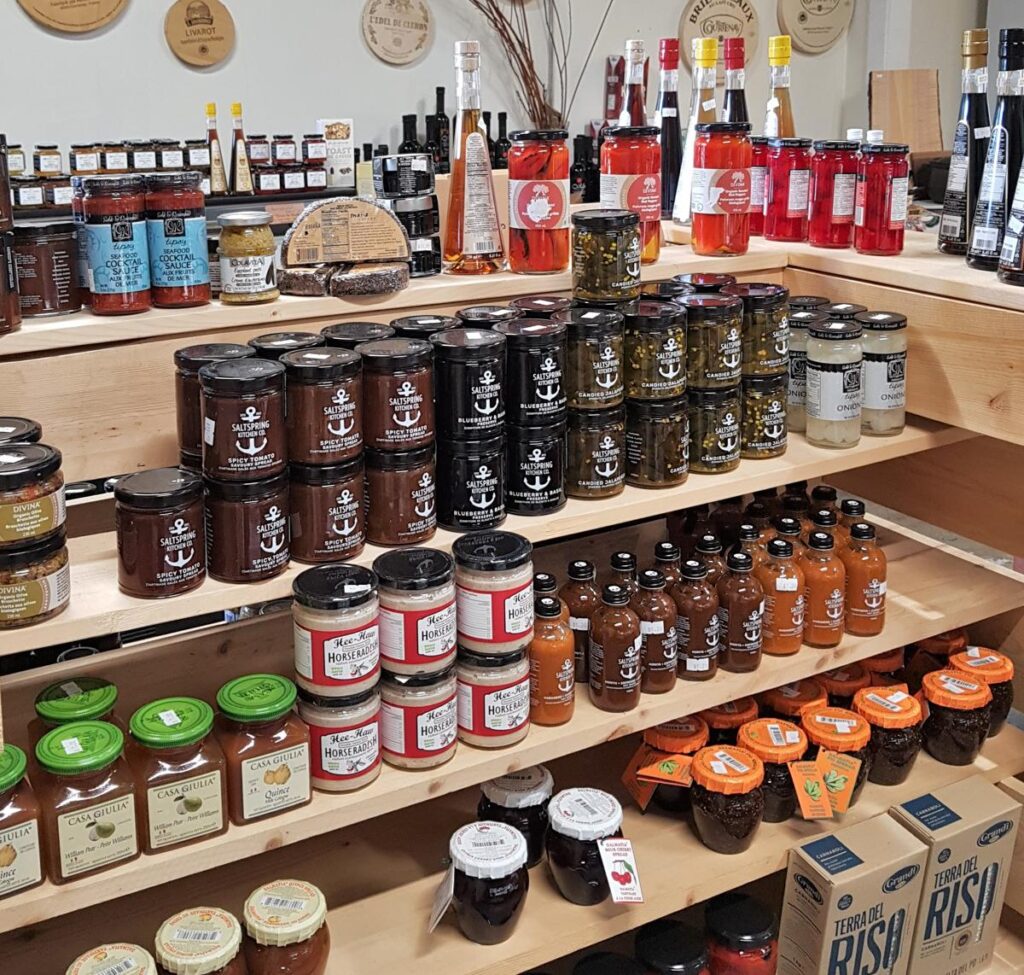
A short drive takes us to the Valleyview Centre shopping village, home of CURE Artisan Meat and Cheese. This deli and charcuterie shop was launched in 2014 by Brad Boisvert, a Culinary Institute of America-trained chef, who ran a French-inspired locavore restaurant in Cowichan for several years. Here, he turns his talents to creating pâtés, terrines, sausages and cured meats from locally sourced antibiotic-and-hormone-free pork and grass-fed beef, as well as duck, rabbit and lamb. Those questing for the perfect charcuterie board will find it all at CURE: from a large selection of imported and local cheeses to a cornucopia of house-made pickles, mustards, chutneys and relishes, right down to the boards themselves, crafted by Vancouver Island woodworkers. Island artisans figure prominently, by way of salt, jams, kimchi and pasta. So too do nature’s seasonal gifts, like local chanterelles, lobster mushrooms and spot prawns. Fleshing out the offerings are dinner kits, salads, baked goods and an array of imported delights. Sensory overload is a hazard here, but the charming staff comes to our rescue with samplings of wine-washed cheese and barrique-aged honey balsamic vinegar. Predictably, both find a place in our shopping bag before we drive off through the mountains of this remarkable culinary valley.
